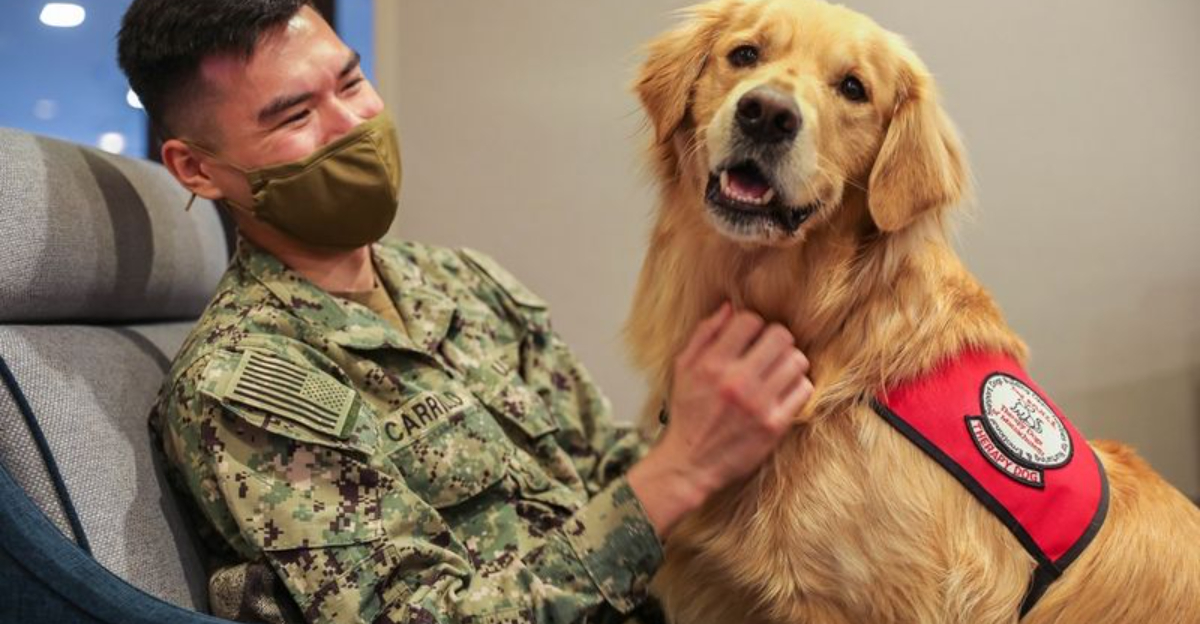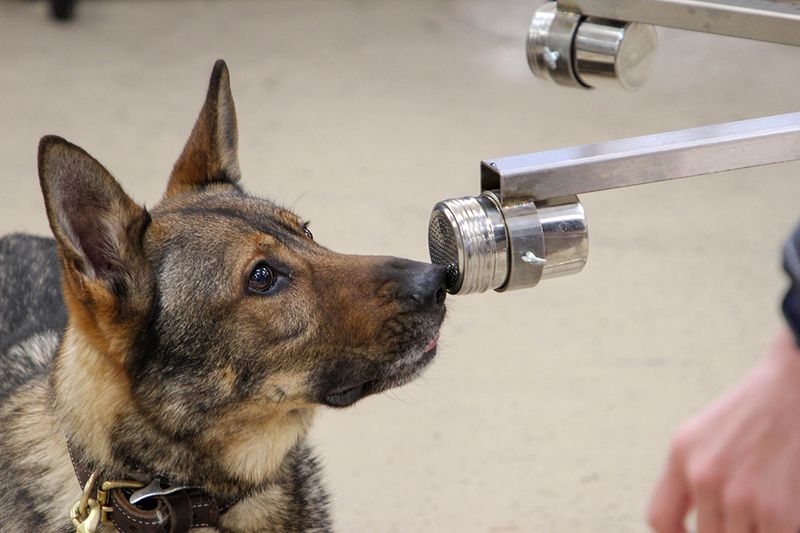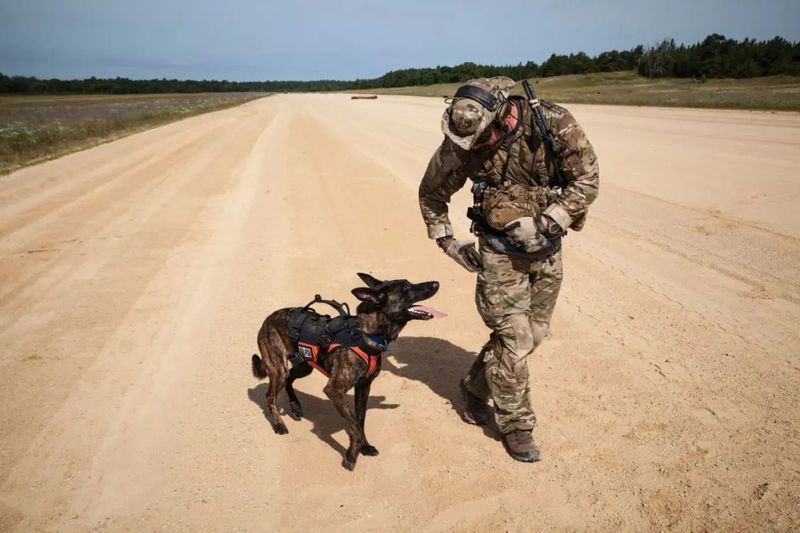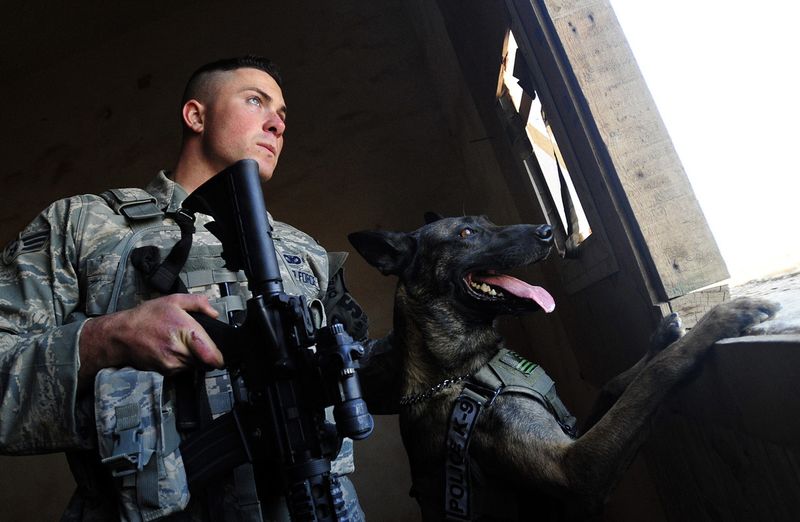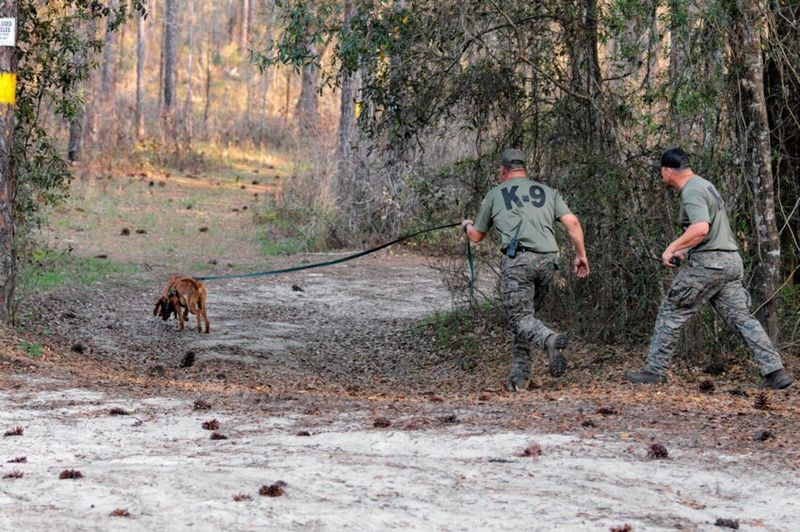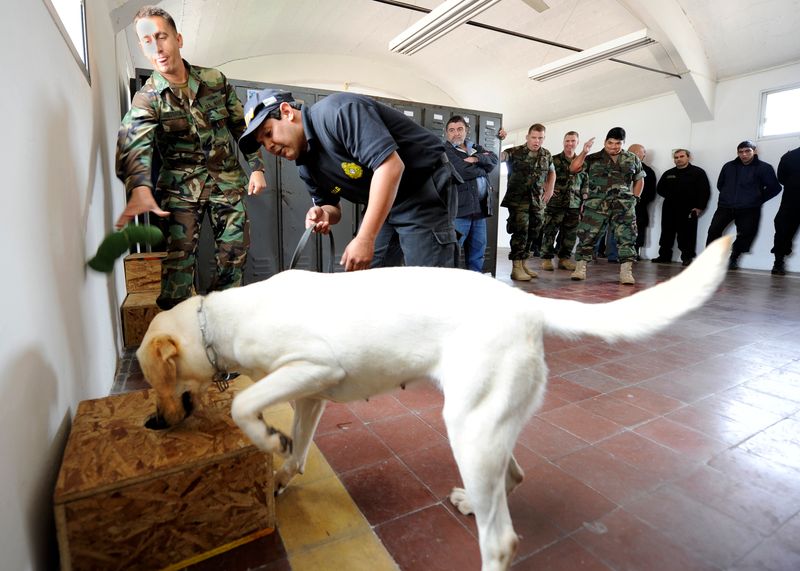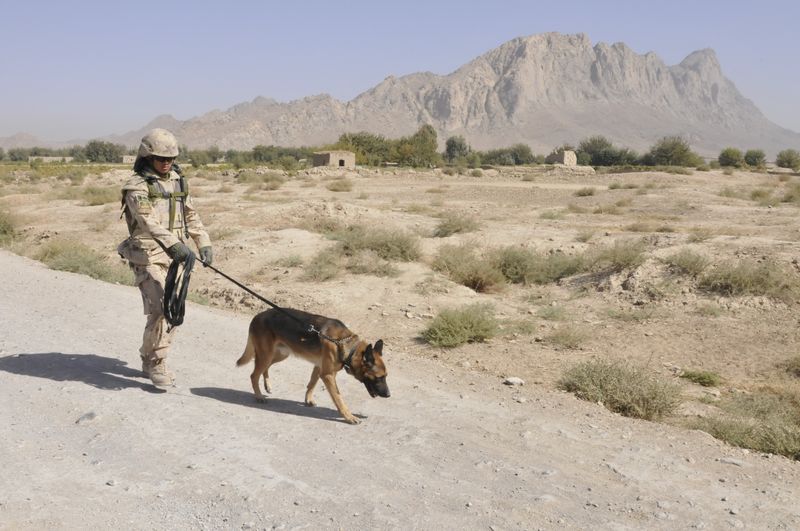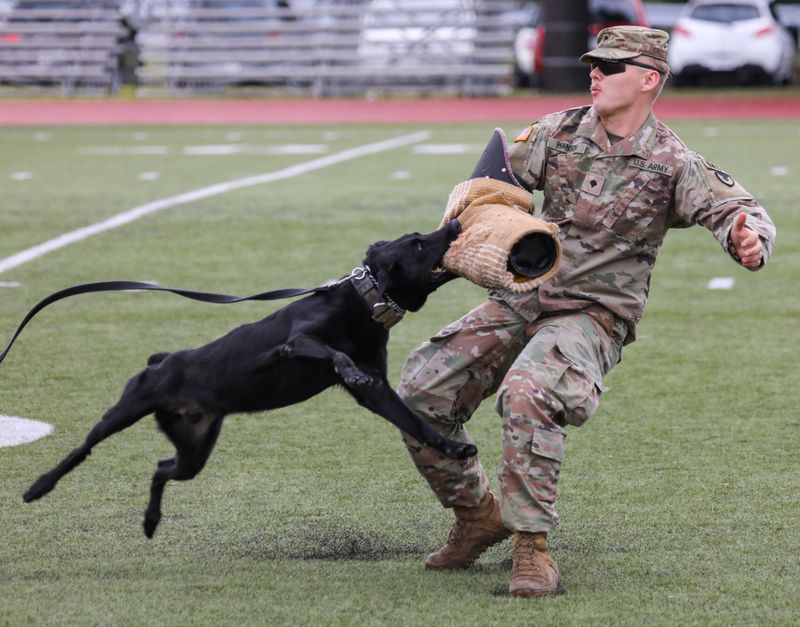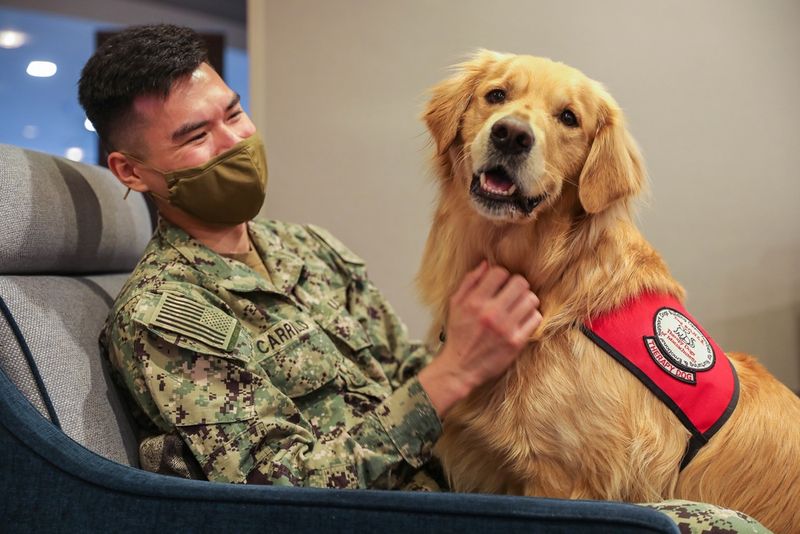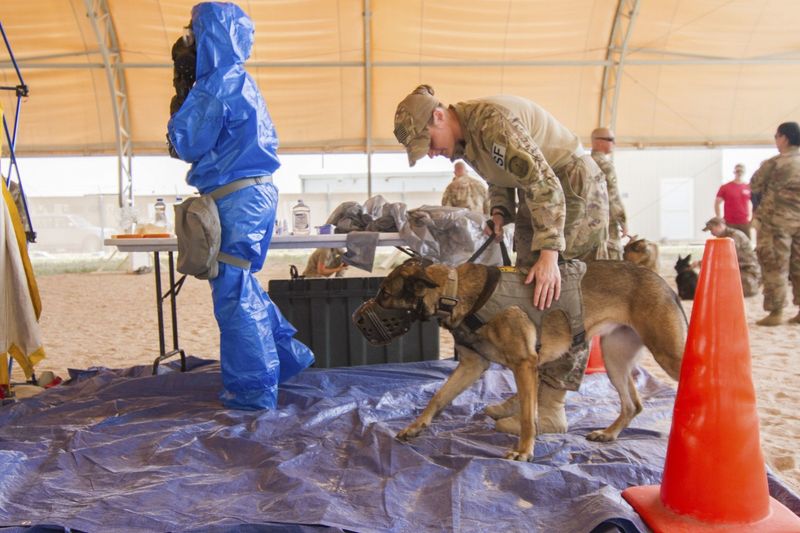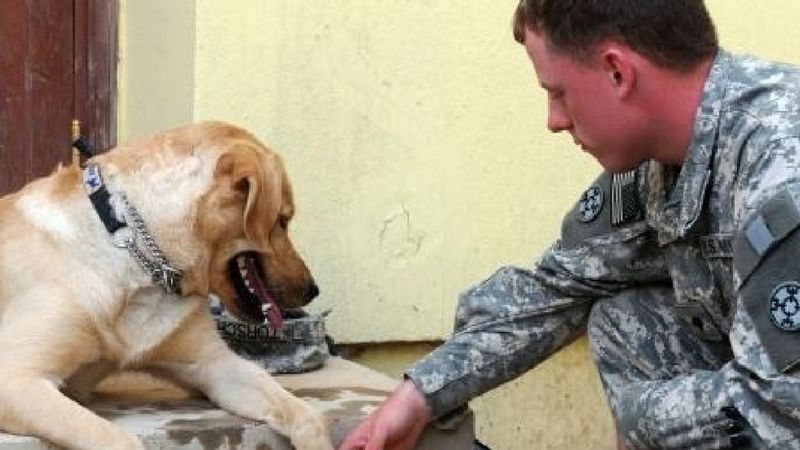Military dogs play a crucial role in armed forces around the world. These highly trained canines perform a wide range of tasks that are essential to military operations. They work tirelessly alongside their human counterparts to ensure safety, security, and mission success. From detecting explosives to providing companionship, military dogs are indispensable members of the military team. Here are 10 amazing jobs they perform every day.
Explosive Detection
With an incredible sense of smell, military dogs are experts at detecting explosives. These dogs undergo rigorous training to identify various explosive materials, making them invaluable in preventing potential threats. Their ability to sniff out danger allows military personnel to operate in safer environments.
Explosive detection dogs are often seen working in high-stress situations, such as airports and conflict zones. Their calm demeanor and precision make them trusted partners. Fun fact: A dog’s nose has up to 300 million scent receptors, significantly more than a human’s.
Their contributions are vital in safeguarding lives and maintaining security.
Search and Rescue
When soldiers are lost or missing, military dogs spring into action. These remarkable canines are trained to locate individuals in various terrains, from dense forests to snowy mountains. Their dedication and persistence are unmatched, often leading to successful rescues.
Search and rescue dogs are equipped with skills to detect human scents over vast distances. Their keen senses and agility enable them to navigate challenging environments effectively. Did you know? Some search and rescue dogs can cover up to 20 miles in a single day.
Their heroic efforts bring hope and relief in dire situations.
Patrol and Sentry Duty
Ever vigilant, military dogs excel at patrol and sentry duties. They accompany soldiers on patrols, using their acute senses to detect any unusual activity or threats. Their presence alone can deter potential intruders and maintain order.
Patrol dogs are trained to work in various environments, ensuring security in both urban and rural settings. They play a critical role in perimeter security. A fascinating fact: Dogs have superior night vision, allowing them to see in the dark where humans might struggle.
Their partnership with soldiers is built on trust and reliability.
Tracking and Trailing
With noses finely tuned for tracking, military dogs are experts at following trails. Whether pursuing a suspect or locating a lost ally, their tracking skills are unparalleled. These dogs can discern specific scents, even in bustling environments.
Tracking dogs are trained extensively to understand scent patterns, making them efficient in various scenarios. Fun fact: A dog’s olfactory bulb is proportionally larger than a human’s, enhancing their scent-processing abilities.
Their contributions are crucial in missions requiring precise scent detection and analysis.
Detection of Illegal Substances
In the fight against illegal substances, military dogs are frontline defenders. These canines are adept at sniffing out drugs and other contraband, ensuring that military installations remain free of illegal activities.
Detection dogs work at checkpoints and border crossings, where their keen noses identify prohibited items. Their rigorous training and natural abilities make them indispensable in maintaining law and order. Did you know? Dogs can differentiate between a wide range of scents, far exceeding human capabilities.
Their vigilance is key in preventing illegal activities and ensuring security.
Search for Improvised Explosive Devices (IEDs)
Military dogs are pivotal in the search for improvised explosive devices (IEDs). These canines are trained to detect the unique scent of explosives used in IEDs, saving countless lives on the battlefield.
Their precision in detecting these hidden threats allows soldiers to advance safely through potentially dangerous areas. The training for IED detection dogs is intense, but their ability to find these devices is unmatched. Interesting fact: Dogs’ superior sniffing skills make them more effective than many technological devices.
Their work in identifying IEDs is a testament to their bravery and skill.
Assistance in Apprehension
Military dogs play a crucial role in apprehending suspects. These canines are trained to chase and detain individuals, providing valuable support to military personnel during operations.
Their speed, strength, and obedience make them formidable partners in high-stakes situations. Dogs used for apprehension are carefully selected and trained for both agility and discipline. Did you know? Military dogs can run at speeds of up to 30 miles per hour.
Their assistance in these operations ensures the success and safety of military missions.
Therapy and Support
Military dogs extend their service beyond the battlefield by providing therapy and support to soldiers. Their calming presence helps alleviate stress and anxiety, contributing to the mental well-being of military personnel.
Therapy dogs are trained to interact with individuals in need of emotional support, offering companionship and comfort. Their gentle nature and intuitive understanding of human emotions make them exceptional healers. Fun fact: Petting a dog can release endorphins, creating feelings of happiness and relaxation.
Their role in providing emotional support is invaluable to those who have served.
Detection of Hazardous Materials
In safeguarding military installations, dogs are trained to detect hazardous materials. Their acute sense of smell allows them to identify chemical, biological, and radiological threats, ensuring the safety of personnel.
These dogs work relentlessly at ports and storage facilities, inspecting shipments for potential dangers. Their training is specialized, focusing on a wide range of materials. Did you know? Some dogs can even detect changes in human body chemistry, identifying potential threats before they manifest.
Their efforts significantly contribute to maintaining a secure environment.
Companion and Morale Booster
Beyond their operational roles, military dogs serve as companions and morale boosters for troops. Their presence provides comfort and a sense of normalcy amidst the rigors of military life.
These dogs offer companionship, reducing the feelings of isolation and stress often experienced in military settings. Their playful antics and loyal nature uplift spirits and foster camaraderie. A heartwarming fact: Studies show that dogs can significantly reduce anxiety and depression in humans.
Their role as companions is as crucial as their operational duties, enhancing the quality of life for those they serve.
